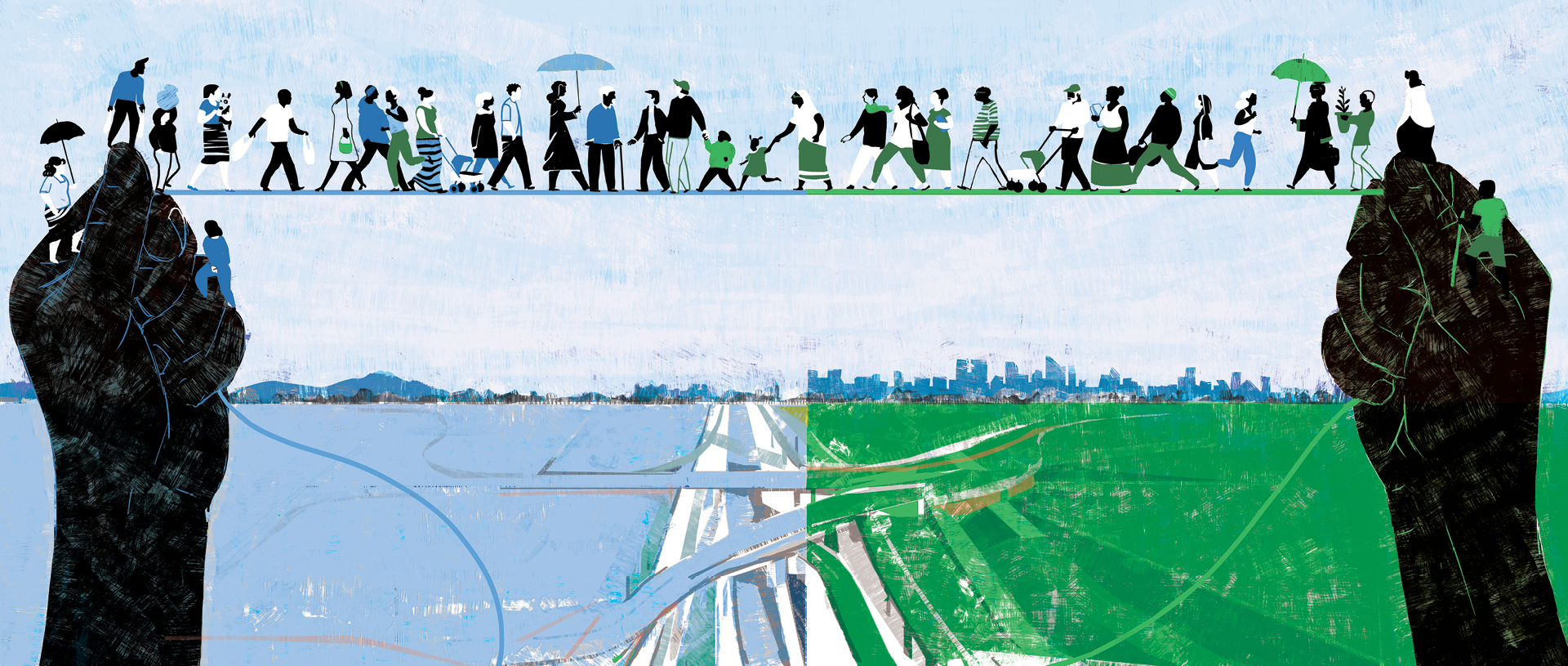
For the past four years, roiling political tension in the United States has been impossible to ignore. While the extreme polarization of Americans didn’t start with the 2016 presidential election, that historic moment felt to some like a chasm opening under their feet, separating them from their fellow citizens with a distance they simply couldn’t cross. Online, we often find ourselves in echo chambers, reading and reposting what we already believe to be true. But in our lives offline, the chasm can open up again—at work, at church, and around the family table. In choosing the theme of politics for this issue of FULLER magazine, we wanted to explore how it’s possible to be so polarized with those we love and how we might talk to—and even find common ground with—those on the other side of the divide.
Brad Strawn brings his experience from the therapy room to share ways we can talk to people whose beliefs incite our anger. Sebastian Kim examines democracy as a political system, using the lens of protecting minorities and working for the common good. Maria Fee shows how the arts can act as a mediator for difficult conversations and a portal for the transcendent experience of accepting what is other. Kurt Fredrickson reminds us that the Lord’s table is where sisters and brothers in Christ find unity. Alexia Salvatierra calls us to use political power to influence decision-making on behalf of the marginalized and oppressed, and in so doing, unite believers who hail from different political parties. And Richard Beck explains how politics have become enmeshed with our self-esteem, making it more difficult than ever, but not impossible, to empathize with people who hold opposing views.
As we barrel toward the 2020 presidential election—and after that, the holiday season and copious amounts of time with family members whose votes we may not understand—let us remember how Jesus, by emptying himself, became a bridge for once uncrossable chasms.
Joy Netanya Thompson (MAT ’12) is communications senior editor at Fuller. She is a writer focusing on the intersections of theology, motherhood, and pop culture, and has published her work in Sojourners, RELEVANT, Motherwell, and Outreach magazine, among others. Find her at joynetanyathompson.com.
For the past four years, roiling political tension in the United States has been impossible to ignore. While the extreme polarization of Americans didn’t start with the 2016 presidential election, that historic moment felt to some like a chasm opening under their feet, separating them from their fellow citizens with a distance they simply couldn’t cross. Online, we often find ourselves in echo chambers, reading and reposting what we already believe to be true. But in our lives offline, the chasm can open up again—at work, at church, and around the family table. In choosing the theme of politics for this issue of FULLER magazine, we wanted to explore how it’s possible to be so polarized with those we love and how we might talk to—and even find common ground with—those on the other side of the divide.
Brad Strawn brings his experience from the therapy room to share ways we can talk to people whose beliefs incite our anger. Sebastian Kim examines democracy as a political system, using the lens of protecting minorities and working for the common good. Maria Fee shows how the arts can act as a mediator for difficult conversations and a portal for the transcendent experience of accepting what is other. Kurt Fredrickson reminds us that the Lord’s table is where sisters and brothers in Christ find unity. Alexia Salvatierra calls us to use political power to influence decision-making on behalf of the marginalized and oppressed, and in so doing, unite believers who hail from different political parties. And Richard Beck explains how politics have become enmeshed with our self-esteem, making it more difficult than ever, but not impossible, to empathize with people who hold opposing views.
As we barrel toward the 2020 presidential election—and after that, the holiday season and copious amounts of time with family members whose votes we may not understand—let us remember how Jesus, by emptying himself, became a bridge for once uncrossable chasms.

Joy Netanya Thompson (MAT ’12) is communications senior editor at Fuller. She is a writer focusing on the intersections of theology, motherhood, and pop culture, and has published her work in Sojourners, RELEVANT, Motherwell, and Outreach magazine, among others. Find her at joynetanyathompson.com.
Maria Fee considers the role art plays in our political conversations.